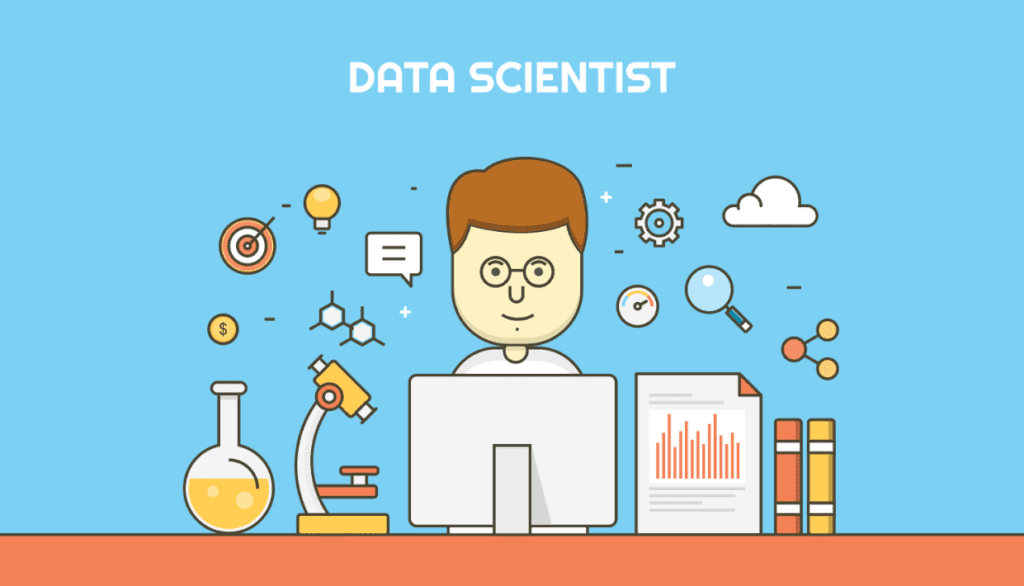Table of Contents
- 1 Breaking the ice- Who are Data Scientists
- 2 Data Scientists vs Data Analysts- What is the difference?
- 3 Qualifications needed to become a Data Scientist
- 4 Pay scale of Data Scientist
- 5 How to become a data scientist
- 6 Get a bachelor’s degree
- 7 Learn relevant programming languages
- 8 Get industry-recognized skills
- 9 Earn certifications
- 10 Internships
- 11 Start applying for jobs
- 12 6 Essentials skills necessary for Data Scientists
- 13 Database knowledge
- 14 Mathematical skills
- 15 Programming languages (Python, R, and SaaS)
- 16 Data wrangling
- 17 Machine learning
- 18 Knowledge of big data tools
Data science has become an increasingly popular major among college graduates and other young people seeking lucrative careers in recent years. Data scientists are in high demand across businesses, but finding an entry-level position has become increasingly difficult in recent years, especially in the European and North American job markets. This blog will discuss who data scientists are, how to become a data scientist and data scientist requirements in 2023-2024.

Breaking the ice- Who are Data Scientists
A data scientist is an expert in data analysis and interpretation. Data scientists use their expertise to enhance business operations and decision-making. Data scientists are highly educated professionals with a solid computational, mathematical, and statistical science foundation. With this information, they can examine massive data sets to spot patterns. In addition, data scientists can develop new strategies for collecting and storing data.
Data Scientists vs Data Analysts- What is the difference?
Data analysts use software like Excel and SQL for sorting through large amounts of data in search of patterns and insights. They assist businesses in making better decisions by analyzing past data.
However, Data Scientists can do much more than that. They do data analysis, develop algorithms, and build predictive models. They employ programming languages like Python and R to mine data for insights, forecast the future, and create data-driven solutions. They unite data science and machine learning disciplines to generate new solutions for complex problems.
Qualifications needed to become a Data Scientist
This section will discuss the data scientist qualifications. To crack the code of data science, you’ll need a strong mathematics background and an analytical mind. You’ll explore the complicated nature of complex data sets. Your reliable travel buddies will be your Python or R coding proficiency and statistical software applications. Most employers prefer to hire data scientists who possess certifications from reputable organizations.
Pay scale of Data Scientist
Here is a summary of the typical salary for Data Scientists based on experience:
- Entry-level (less than one year of experience): $86,670 (1,313 salaries)
- Early career (one to four years): $98,293 (7,474 salaries)
- Mid-career (five to nine years): $113,769 (2,431 salaries)
- Experienced (ten to nineteen years): $125,122 (639 salaries)
How to become a data scientist
This section will discuss the step-by-step process of how to be a data scientist:
Get a bachelor’s degree
One of the best ways to enter the field of Data Science is to earn a bachelor’s degree in a related field, such as data science, statistics, or computer science. It is one of the most prevalent hiring criteria for data scientists.
Learn relevant programming languages
While a Bachelor’s degree will get you started, you’ll need to learn in-demand languages like Python, R, SQL, and SAS to excel. These languages will serve as your go-to resources for effectively managing massive datasets.
Get industry-recognized skills
The role of Data Scientist also requires familiarity with Data Visualization, Machine Learning, and Big Data tools. A thorough understanding of data management, cleaning, sorting, and analysis is essential when working with large datasets.
Earn certifications
Certifications in popular data visualization tools like Tableau and Power BI showcase your expertise with these programs and are highly valued by employers in the data science field. These certificates indicate your knowledge and open doors to appealing employment prospects in this industry.
Internships
Internships are an excellent opportunity to break into the competitive field of data science. Search for positions with titles such as data engineer, statistician, business intelligence analyst, or data analyst. Internships are a great way to learn about a field and gain practical experience.
Start applying for jobs
When your internship is over, you can apply for entry-level positions with the same company. If something else appeals to you, start looking for entry-level opportunities in data science, data analysis, and data engineering. Working in one of these positions will allow you to build your resume and career while you learn and develop your skills.
6 Essentials skills necessary for Data Scientists
In this section, we will discuss the essential skills how to become a data scientist:
Database knowledge
Data scientists must be well-versed in relational databases like Oracle Database, MySQL, Microsoft SQL Server, and Teradata.
Mathematical skills
Statistics, probability, and mathematical analysis provide the mathematical framework for data analysis. Therefore, data scientists should have a solid understanding of these subjects.
Programming languages (Python, R, and SaaS)
The ability to proficiently use computer languages like Python, R, and SaaS is crucial. They are essential to a data scientist’s toolkit because they support data analytics and machine learning.
Data wrangling
Data wrangling abilities are critical for cleaning, manipulating, and organizing data. Use programs like R, Python, Flume, and Scoop to manage your data better.
Machine learning
It is vital to have a thorough understanding of machine learning. Familiarize yourself with various machine learning algorithms for data analysis and insight extraction.
Knowledge of big data tools
In the age of big data, knowing how to use technologies like Apache Spark, Hadoop, Talend, and Tableau is essential for dealing with massive and complicated datasets that are beyond the capability of traditional data processing applications. To become a data scientist, it is critical to be proficient in these skills and technologies.











